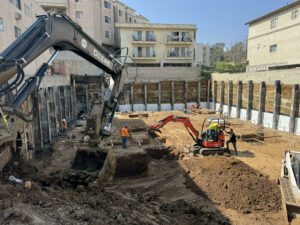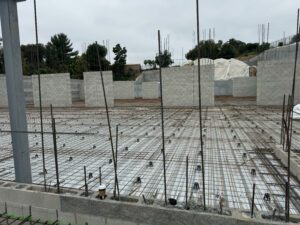Methane emissions contribute significantly to climate change, posing environmental risks that necessitate swift action. For this reason, the Orange County Fire Authority (OCFA) plays a critical role in methane mitigation by developing and implementing comprehensive strategies that help reduce emissions. For example, by leveraging cutting-edge technology and adopting proactive regulatory measures, OCFA leads the way in transforming urban environments for a more sustainable future.
Historical Background of Methane Emissions and OCFA’s Involvement

Methane is a formidable greenhouse gas (GHG) that significantly impacts global warming. Although methane has a shorter atmospheric lifespan than carbon dioxide, its capacity to trap heat is much higher. Thus, OCFA recognized this challenge early and has worked diligently to reduce emissions in Orange County and beyond. The organization’s commitment to safety and innovation has enabled it to develop effective mitigation strategies to protect the environment while ensuring public safety.
OCFA’s Comprehensive Methane Mitigation Strategies
Monitoring and Detection Technologies
OCFA uses advanced methane detection tools, such as infrared cameras and remote sensors, to identify methane leaks rapidly. Infrared cameras make invisible gas emissions visible, which allows inspectors to spot leaks easily. Remote sensors continuously monitor emissions across vast regions, alerting OCFA staff in real time if leaks are detected. As a result, OCFA ensures timely interventions and swift corrective actions, preventing small leaks from becoming large-scale hazards.
Regulatory Framework and Compliance Policies
OCFA collaborates with local governments and environmental organizations to establish and enforce comprehensive regulatory frameworks for methane emission control. These frameworks ensure businesses comply with stringent safety and environmental standards, hence reducing the risk of leaks. OCFA regularly audits businesses to verify adherence to these guidelines and provides support in implementing safer methane management practices.
Preventative Maintenance Programs for Leak Prevention
OCFA emphasizes proactive maintenance of industrial equipment prone to methane leaks. Their preventative maintenance programs involve regular inspections and repairs, identifying potential hazards before they escalate. Technicians trained by OCFA perform detailed checks on pipelines, compressors, and storage tanks, often repairing or replacing components showing early signs of wear and tear. As a result, this approach minimizes unplanned outages and ensures safer, long-term equipment operation.
Public Awareness and Education Initiatives
Raising public awareness about methane emissions and their consequences is a priority for OCFA. The organization actively engages communities through educational programs designed to help residents and businesses understand the importance of methane mitigation. OCFA conducts workshops, distributes educational materials, and provides resources to empower the public to identify and report potential methane hazards, fostering a collaborative approach to environmental safety.
Environmental Impacts Demonstrating the Importance of Methane Mitigation
Air Quality Improvements from Methane Reduction
Methane leaks often release volatile organic compounds (VOCs) and other pollutants, contributing to smog formation and poor air quality. VOCs can interact with nitrogen oxides in the atmosphere to form ground-level ozone, which is a major air pollutant with harmful health effects. Because of OCFA’s diligent monitoring and leak prevention efforts, air quality in Orange County has improved, reducing smog levels and benefiting both human health and ecosystems.
Climate Change Mitigation through Emission Reduction
Methane is a potent GHG that contributes to rapid global warming. OCFA’s mitigation strategies address this by reducing methane emissions from industrial sources, oil and gas infrastructure, and agricultural facilities. Specifically, their comprehensive detection and repair programs help minimize leaks, ensuring methane is not released into the atmosphere unnecessarily. Therefore, OCFA plays a significant role in mitigating climate change.
Biodiversity and Ecosystem Protection Efforts
Improved air quality and reduced methane levels help preserve biodiversity. Methane leaks and VOC emissions can disrupt sensitive wildlife habitats and damage plant life. By preventing methane from reaching the atmosphere and lowering pollutant levels, OCFA’s efforts contribute to protecting diverse ecosystems in and around Orange County.
OCFA’s Technological Advancements in Methane Mitigation
Real-Time Emission Mapping Software
OCFA’s real-time mapping software provides a comprehensive view of methane emissions across geographic regions. The software uses data collected from remote sensors and infrared cameras, allowing inspectors to visualize leak locations on an interactive map. This approach helps OCFA target resources more efficiently and intervene quickly by focusing efforts where emissions are highest.
Automated Leak Detection Systems
Automated leak detection systems monitor pipelines and equipment continuously, instantly alerting OCFA staff to potential issues. They utilize gas detection sensors placed along critical points in the network, providing accurate, round-the-clock surveillance. Altogether, this automated approach eliminates the need for frequent manual inspections and enables rapid response times, minimizing methane losses and potential hazards.
Predictive Maintenance with Data Analytics
Predictive maintenance uses historical data to identify patterns indicating future leaks or failures. Thus, by analyzing trends in equipment performance and correlating them with leak incidents, OCFA can predict which assets are at higher risk and schedule timely repairs. This proactive approach helps prevent leaks before they occur, ultimately extending the lifespan of equipment and improving safety.
Community Engagement and OCFA Stakeholder Involvement
Public Outreach Programs Raising Awareness

OCFA’s public outreach programs aim to educate residents and local businesses about methane emissions and their impact. These initiatives include community workshops, information booths at public events, and multimedia campaigns that explain methane’s effects on health and the environment. In this way, OCFA empowers the public with knowledge, encouraging greater vigilance and active participation in emission reduction.
Industry Partnerships Sharing Best Practices
Partnering with key industry players allows OCFA to access valuable insights, share best practices, and promote safer methane management. Industry partners contribute their technical expertise, offer data on emission sources, and help OCFA pilot new detection and maintenance technologies. Hence, this collaborative effort strengthens mitigation strategies and accelerates the adoption of innovative solutions.
Government Collaboration for Policy Alignment
OCFA coordinates with local and state governments to ensure its methane mitigation aligns with broader environmental policies and goals. Government agencies provide regulatory support, promote legislative changes, and fund research that enables OCFA to expand its reach. Because of this, cooperation is vital to creating consistent methane control policies that protect public health and environmental sustainability.
Future Plans for OCFA’s Methane Mitigation Strategies
Expanding Monitoring Networks for Better Surveillance
OCFA aims to expand its network of methane monitoring stations across Orange County, improving data collection and risk assessment. Thus, by increasing the density and reach of its monitoring network, OCFA will detect leaks more efficiently, providing comprehensive methane surveillance over a larger area.
Enhanced Regulatory Measures for Industry Compliance
OCFA is committed to strengthening regulations that hold businesses to higher standards, ensuring methane mitigation remains a priority across all industries. The organization will continue to advocate for strict emission limits and compliance checks, reducing the likelihood of harmful leaks and creating a more responsible business environment.
Integrating Renewable Energy Solutions for Emission Control
By promoting the use of biogas and other renewable energy sources, OCFA envisions a future where methane emissions are drastically reduced. Biogas from agricultural waste and landfill gas can be captured and converted into clean energy, eventually turning methane from a pollutant into a valuable resource. This transition will be crucial in reducing dependency on fossil fuels and minimizing methane emissions.
Final Thoughts on OCFA’s Sustainable Future Vision
OCFA’s unwavering commitment to methane mitigation sets an example for other organizations worldwide. Through innovative technology, proactive regulation, and community engagement, the organization continues to pioneer groundbreaking strategies that help tackle the global methane challenge. OCFA safeguards the environment and paves the way for more sustainable urban living by working towards a future where methane emissions are minimized.
